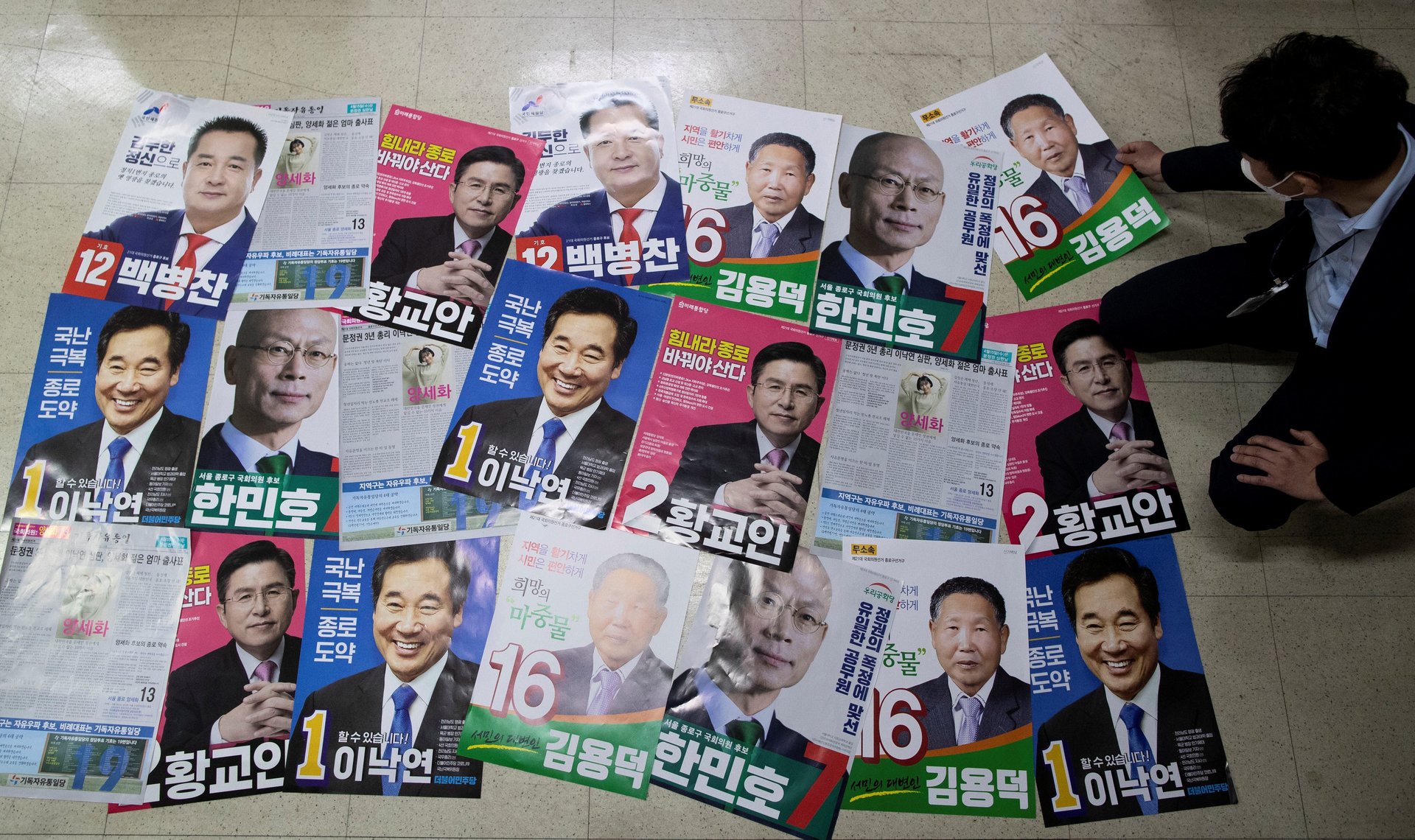How South Korea is running a nationwide election in the midst of a pandemic
As countries around the world have delayed elections due to the coronavirus pandemic, South Korea is going ahead with voting next week, as it tries to balance its obligations both to civil liberties and to public health.


As countries around the world have delayed elections due to the coronavirus pandemic, South Korea is going ahead with voting next week, as it tries to balance its obligations both to civil liberties and to public health.
On April 15, some 44 million Koreans will vote for members of its National Assembly, where 300 seats are up for grabs. President Moon Jae-in’s ruling Democratic Party of Korea (DPK) is hoping to maintain its majority by capitalizing on widespread public approval of the country’s extensive Covid-19 measures. His approval ratings have risen during the pandemic, and the DPK has adopted “winning the Covid-19 war” as its main campaign slogan. The DPK and the main opposition United Future Party have also both promised cash relief to households to help cushion the blow from the pandemic.
While countries such as the UK and Ethiopia have postponed polls due to coronavirus, Korea is able to go ahead with its election in part because the country is not under any sort of strict lockdown measures. Instead, it has chosen a widely lauded strategy of stringent testing, contact tracing, and isolation, and most of the public have complied with social distancing voluntarily. The number of newly confirmed Covid-19 cases in Korea has fallen to below 50 cases a day for the last two days.
The National Election Commission (NEC) said that it would regularly disinfect all 14,330 polling stations and run temperature checks at the doors. Anyone showing temperature readings higher than 37.5 °C (99.5 °F) would be directed to special booths. Voters will be provided with hand sanitizer and plastic gloves when they enter the voting booths, and everyone must keep at least a meter away from each other while waiting in line. Masks are strongly required.
With over 10,000 confirmed Covid-19 cases in Korea, there are also special arrangements for those who have contracted the disease. They can vote by mail from home, or use early absentee voting stations that will be set up at Covid-19 patient centers on April 10. The centers house patients who have symptoms that do not require formal hospitalization.
Then there are the over 46,000 people who are under quarantine. The number of people in isolation soared quickly after the country imposed a 14-day self-quarantine requirement on anyone entering Korea starting on April 1. According to the KCDC, around half of those people will still be in quarantine on voting day.
The NEC said it is still trying to work out how it can provide ballots to the thousands of newly quarantined persons required to stay home until after April 15, as registration for voting by mail ended on March 28.
“Realistically speaking it will be difficult to work something out when these people are banned from leaving their homes due to the Infectious Diseases Prevention Act,” Cho Jung-hwan, an NEC official, told Quartz, referring to the law that punishes those who breach self-quarantine orders with up to one year in prison or a 10 million won ($8,200) fine. “We are still trying to figure out some kind of middle ground in this clash between the right to vote and the right to public health.”
However, over 88,000 voters—around half of the number of eligible Korean voters living abroad—have not been able to vote at embassies or consulates overseas. The NEC said it has shut down 94 overseas polling stations in 58 countries due to Covid-19 during the overseas voting period, which lasted from April 1 to 6.
Election campaigning has also adapted to the new realities of the pandemic, with activities taking on a decidedly more low-key tone than in previous elections. Campaign rallies draw much smaller crowds, and volunteers who once danced and chanted to drum up support for candidates now stick to just handing out flyers.
As the election draws nearer, however, some candidates are finding it hard to resist loosening up and getting their faces out there in front of the cameras as voting day beckons. Former prime minister Lee Nak-yeon, for example, was among the politicians seen campaigning in Seoul over the weekend without a face mask, with many supporters crowding around him also showing their faces.
Lee’s actions also reflect increasingly lax attitudes in Korea toward social distancing and other safety precautions, as the fear of coronavirus gradually subsides with the falling new case count. Parks on the weekend, for example, were full of people having picnics, while long lines of people waited to go on hiking trails. The KCDC, however, continues to warn that “explosive community outbreaks” remains a possibility.